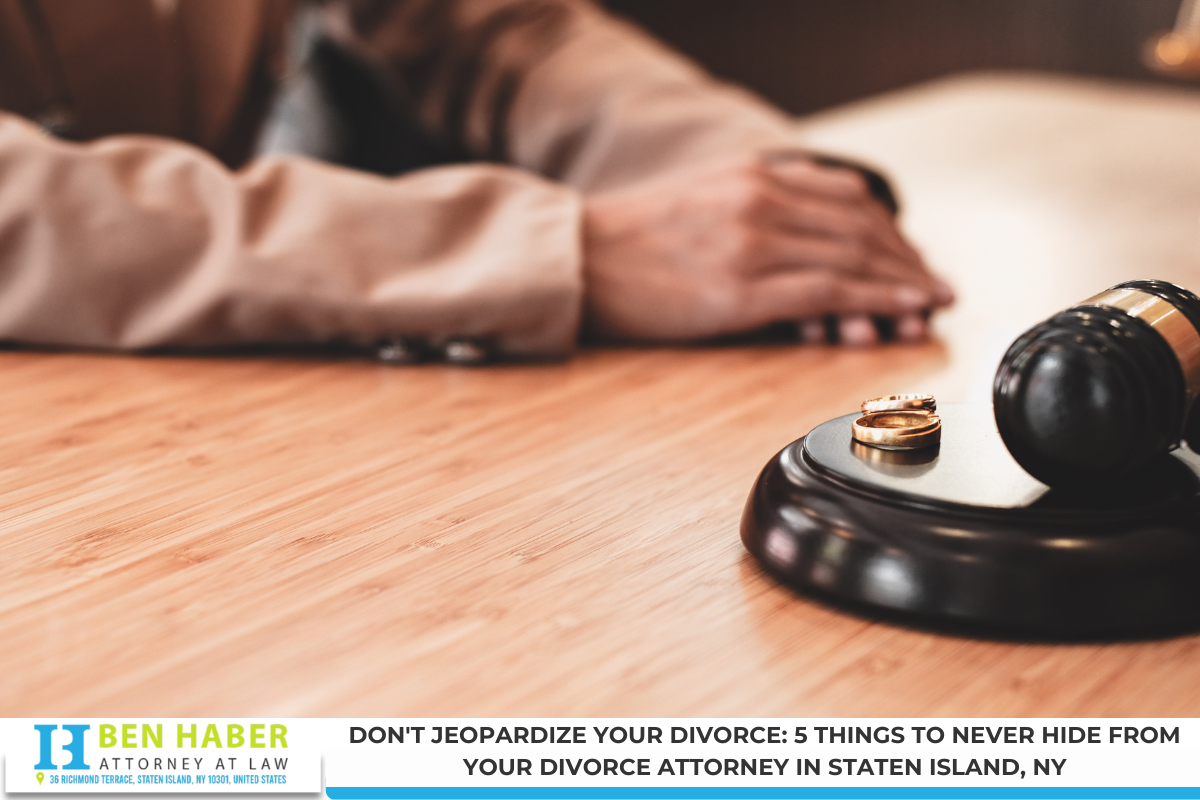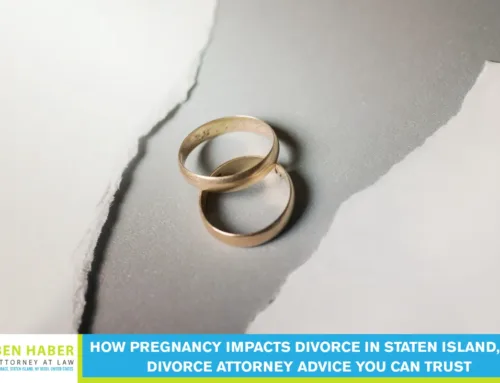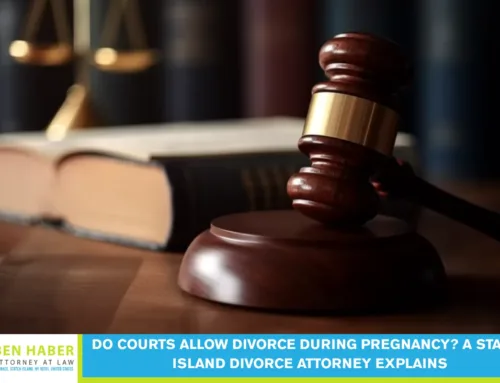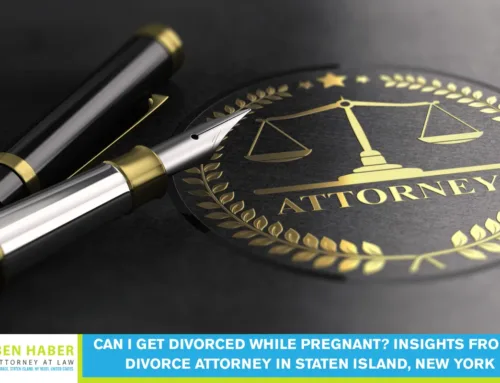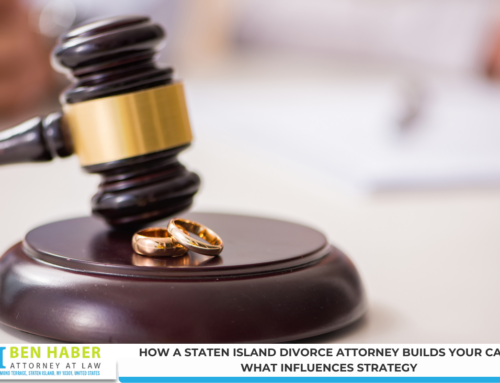When going through a divorce, one of the most important things you can do is be honest with your Staten Island divorce attorney. A divorce can be an emotional, stressful, and sometimes overwhelming experience-but hiding key information from your divorce lawyer can make everything worse. It can even affect how much child custody, property, or support you may receive. If you live in Staten Island or anywhere in New York, your divorce attorney needs to know everything to give you the best legal advice and protect your rights. That’s what they’re trained for. They understand the legal process, the courts, and how family law works in your area. Let’s look at the five things you should never hide from your divorce lawyer-and why telling the truth could help save your case.
Why Honesty With Your Divorce Attorney Matters
Divorce is a legal process. It’s more than just splitting up-there are court orders, hearings, and decisions about child custody, child support, and marital assets. Your divorce attorney can only defend your interests if they know all the facts. In New York, courts follow equitable distribution laws, which means the judge will try to divide property fairly. But “fair” doesn’t mean “equal.” That’s why full disclosure is critical. Hiding things can make you lose out-on money, time with your children, or even your legal representation.
1. Hidden or Undisclosed Assets

One of the biggest mistakes people make is hiding assets. That includes:
- Bank statements not shared with your attorney
- Secret retirement account statements
- Unreported income
- Family heirlooms, jewelry, or valuable collectibles
- Cryptocurrencies or digital wallets
- Side businesses or freelance income
In New York, the family court requires each party to fill out a Statement of Net Worth. If you leave things off, the court might see it as lying. A forensic accountant or a deposition during the trial might uncover hidden money, which could hurt your credibility. It could also lead to serious legal consequences-such as losing your part of the property division, being fined, or being found in contempt of court.
2. Debts and Financial Liabilities

Just like assets, you must tell your divorce lawyer about your marital debt. This includes:
- Credit cards in your name or joint accounts
- Unpaid income tax returns
- Student loans
- Gambling debts
- Money owed to friends or family
If you hide your debts, your spouse might not be responsible for any part of them. And you could end up with more than your fair share. Your attorney can help balance these during the settlement if they know the full picture. Remember, the legal process looks at both your financial situation and your spouse’s to create a fair outcome under New York’s domestic relations laws.
3. Affairs or New Relationships

Even though New York is a no-fault divorce state, having an affair or a future partner during the divorce can still impact the case. For example:
- Your new partner may affect child custody or visitation schedule if the court believes the child is at risk.
- Spending money on a new relationship could be seen as misuse of marital assets.
- If your spouse finds out, it could create more conflict, raising legal expenses.
Let your divorce attorney know if you’re dating or in a relationship. It helps them prepare, especially if this could come up in mediation, trial, or even in an out-of-court settlement.
4. Substance Abuse or Criminal History

It’s uncomfortable to talk about things like drug use or a restraining order, but hiding them can be even more dangerous to your case. This includes:
- Past or current issues with drugs or alcohol
- A criminal record
- Any accusations of child molestation, stalking, or domestic violence
- Ongoing court cases
These issues can seriously affect custody, child support, and whether a judge allows unsupervised visits. Your family law attorney can only defend you properly if they know what might be brought up in court. Withholding this information can backfire, especially during a lawsuit or litigated case.
5. Custody Plans or Moving Away with the Children

If you are thinking about moving-especially out of state-with your children, you must tell your attorney. Keeping this secret is one of the fastest ways to lose custody or visitation rights. Here’s why:
- The court wants to make decisions based on the Best Interest of the Child.
- Secretly moving or planning relocation without permission can lead to losing parenting time.
- It could lead to courtroom experience where the judge limits your rights.
A good family law attorney can help you file a proper request, change your visitation schedule, and give the court what it needs to approve the move legally.
Building Trust With Your Divorce Lawyer
Your divorce lawyer is your teammate. The more they know, the more they can help. Keeping secrets could hurt you, your children, and your future. Here’s how you can build a strong case with your attorney:
- Be organized: gather bank statements, retirement accounts, income tax returns, and any personal notes.
- Be open: share your emotions, fears, or questions during the divorce process.
- Be proactive: ask your lawyer about things you don’t understand-this is part of getting the best legal advice.
No matter what’s happened in the past-your divorce attorney is there to protect your legal rights, not judge you. They’ve seen it all and can guide you through even the toughest parts of the family law system.
How to Protect Your Future in a Staten Island Divorce
Being honest with your divorce attorney isn’t just about staying out of trouble-it’s about getting the support you need. Whether your case goes to trial, involves mediation, or ends with a simple settlement, telling the truth gives your legal representation the power to protect you. Your family law attorney understands the emotional toll a divorce can take-especially if there are children, money issues, or past mistakes involved. But with full honesty, good communication, and strong legal support, you’ll be on a much better path toward a stable future. If you’re going through a divorce in Staten Island, don’t risk your rights, your assets, or your peace of mind. Be open, stay informed, and let your divorce lawyer help you move forward with confidence.
Staten Island Divorce Attorney – Benjamin Haber

When facing divorce, you need a trusted divorce attorney who understands the emotional and legal challenges ahead. At the Law Office of Benjamin Haber, we provide honest, experienced guidance tailored to your unique situation. Whether you’re dealing with child custody, marital assets, or complex property division, we’re here to protect your rights every step of the way. Located in Staten Island, New York, we proudly serve clients throughout the surrounding areas. Don’t jeopardize your future by going it alone-get the legal advice you can count on. Call us today at (718) 442-0960 or fill out our contact form to schedule a confidential consultation with a dedicated divorce lawyer who puts your needs first.
Frequently Asked Questions
1. Can hiding assets during divorce in New York lead to criminal charges?
Yes. If you intentionally hide assets from the court or your divorce attorney, you could be found guilty of perjury or fraud. This may result in financial penalties, court orders for asset redistribution, or even criminal charges in extreme cases. New York courts take financial dishonesty very seriously.
2. How can a divorce attorney find hidden income or cryptocurrency?
Experienced divorce lawyers often work with forensic accountants to analyze bank statements, tax returns, and spending patterns. They may also request a deposition, issue subpoenas, or search blockchain records to uncover hidden cryptocurrency wallets or unreported income.
3. Does adultery still matter in a New York divorce if it’s a no-fault state?
While New York allows no-fault divorces, adultery can still be relevant-especially when it affects child custody or marital assets. For example, spending large amounts on a new partner could impact property division, and exposing children to unsafe situations may influence custody decisions.
4. What happens if my ex-spouse finds out I lied to my attorney during the case?
If your spouse uncovers lies-like hidden marital debt or assets-it can destroy your credibility in court. Your divorce lawyer may have to do damage control, and the judge may issue new court orders, fines, or award your spouse more during the settlement or trial.
5. Are divorce attorneys in Staten Island required to report client dishonesty to the court?
Generally, attorney/client privilege protects private conversations. However, if you ask your divorce attorney to help commit fraud or lie under oath, they may withdraw from the case or, in rare cases, notify the court to protect their professional ethics.
6. Can you change lawyers if you’ve withheld information from your current one?
Yes, you can change your legal representation at any point. However, switching lawyers may increase your legal expenses, delay the divorce process, and create new challenges-especially if you’ve already gone to mediation, court, or deposition.
7. What documents should I gather before meeting with my divorce attorney?
It’s smart to prepare these items:
- Recent bank statements
- Retirement account statements
- Income tax returns (past 2-3 years)
- Proof of debts (loans, credit cards)
- Real estate or property titles
- Any prenuptial or postnuptial agreements
- List of valuables (art, jewelry, family heirlooms)
8. How is the Statement of Net Worth used in a New York divorce?
In Staten Island and throughout New York, both spouses must submit a Statement of Net Worth. This legal form includes income, expenses, assets, and debts. The court uses it during the divorce process to ensure fair property division, child support, and spousal support.
9. Do New York courts treat hidden debt the same as hidden assets?
Not exactly. While both can harm your case, hiding marital debt can force one spouse to take on unfair financial responsibility. Courts may issue court orders or adjust property division to balance the deception. Still, hiding anything-asset or debt-can damage your standing.
10. Will my spouse’s lawyer be able to subpoena my personal bank accounts?
Yes. During the litigation or discovery phase, your spouse’s divorce attorney can subpoena bank records, pay stubs, or investment account details. This is especially common in contested cases involving significant marital assets or suspected dishonesty.
Read How a Staten Island Divorce Attorney Builds Your Case: What Influences Strategy

